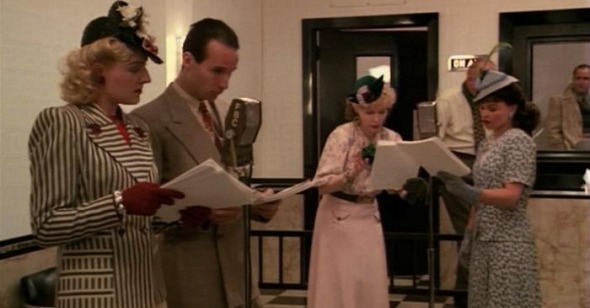Michael Koresky on Radio Days
Like the flashback opening minutes of Annie Hall stretched out to feature length, Radio Days is so brimming with dog-eared Brooklyn nostalgia it practically feels like a family photograph album narrated by a wistful and daffy uncle. The film has been likened to Fellini’s Amarcord, and it does appear similar in that it seems to court audience approval even as it burrows into its filmmaker’s own memories with abandon. Yet I have always infinitely preferred Radio Days’ somber, enveloping sepias to Amarcord’s spangled excesses, though it may be only because Fellini’s elaborate provincial quirk has been imitated so many times since, and even perhaps set the standard for crowd-pleasing foreign products. A memory piece about Allen’s childhood, depicted through his fondness for radio songs and broadcasts, Radio Days is fleet and charming from beginning to end, functioning almost as sketch comedy—it’s a series of vignettes, smoothly connected through period standards and lush costumes. A very young Seth Green is the prepubescent Woody surrogate (preferable to Jason Biggs, no?), living with his parents in a modest two-story house in Rockaway; in between their ridiculous squabbles (“Are you telling me you think the Atlantic is a better ocean than the Pacific?”), Julie Kavner and Michael Tucker find so many poignant moments of working-class exhaustion (Tucker refuses to tell his son what he does for a living; Kavner daydreams about the lives of the glamorous voices she listens to on the radio) that they transcend the film’s comic black-out pacing.
What truly elevates Radio Days, though, is its central dichotomy, between the warm glow of childhood remembrance and the haze of celebrity tales and rumors of the rich and famous. Cross-cutting between the family’s shabby Brooklyn home and the affluence of the radio stars they admire, Radio Days timelessly and touchingly evokes the ever-present seductive pull of the myth of celebrity (later delineated in Allen’s less successful but still underrated Celebrity) on admiring, nonfamous folks; hilariously, the faces we see often don’t correspond to the voices distorted over the airwaves, especially when the Masked Avenger is played, of course, by little lisper Wallace Shawn. The most memorable performance in the film, however, is from Mia Farrow’s gloriously ditsy Sally, followed from squeaky-voiced cocktail waitress (“Cigar? Cigarette?”) to lush-throated radio personality; Sally is one of Farrow’s greatest creations, along with the terrific, layered work she put forth in Broadway Danny Rose, September, Alice, and Husbands and Wives, all of which were the best roles granted to the actress since her Rosemary’s Baby tour de force. “Hawk! I heah the cannons roah! Is it the king approaching?” she squwaks like Betty Boop on helium in front of the mirror, practicing her speech-class lessons. Yet despite Sally’s positioning as mere comic relief, Farrow imbues her with both sweetness and humanity, and her rise to the top never feels overly opportunistic or unearned.
Radio Days is playing at Film Forum Friday and Saturday, though it would have been the perfect film for New Years’ Eve, as it ends with a memorably emotional shift into 1944, showing the celebrations in both the household and a glamorous gathering of broadcast stars. Diane Keaton shows up at the party and sings Cole Porter’s lovely “You’d Be So Nice to Come Home To,” and it wafts across the airwaves and right into the two-story Brooklyn house, where the family members hug each other tenderly and joyously, wish for an end to the war, and generally enjoy their love for one another. It’s a humble complacency that feels missing from most of Woody’s work, which does view wealth and privilege with the same love-hate relationship as Radio Days but also usually aligns itself with the upper-class Manhattan that Woody ascended to. Only in the past does the writer/director focus on the working class, as he obviously views it as a place he crawled out from—a problematic strain in his work, wonderfully grappled with in Radio Days.
